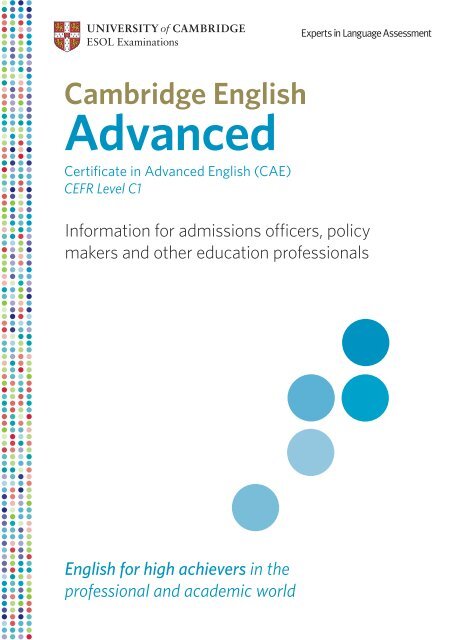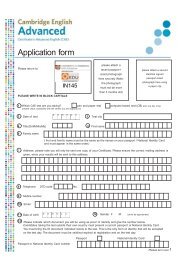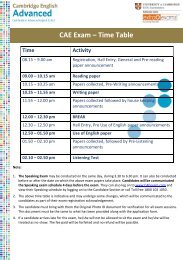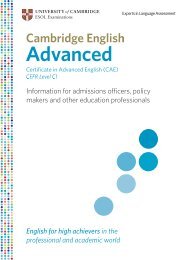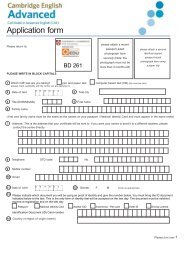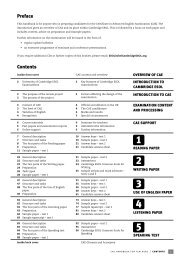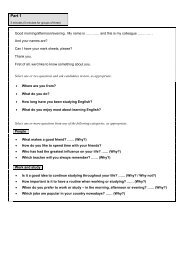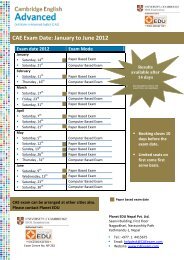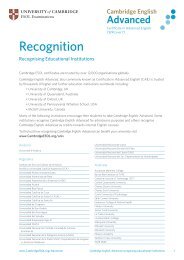View / download - CAE Exam
View / download - CAE Exam
View / download - CAE Exam
Create successful ePaper yourself
Turn your PDF publications into a flip-book with our unique Google optimized e-Paper software.
Information for admissions officers, policy<br />
makers and other education professionals<br />
English for high achievers in the<br />
professional and academic world
Accept Cambridge English: Advanced (<strong>CAE</strong>) and<br />
make a difference to the success of your student<br />
recruitment process<br />
Demand for international education is stronger than ever.<br />
Sustainable growth and development is increasingly linked to the<br />
development of knowledge-based economies. Universities and<br />
colleges play a critical role in this.<br />
Declining public funds, the arrival of international competition and<br />
new providers in the education sector have meant that universities<br />
and colleges now face unprecedented challenges. Providing the<br />
best quality education for our students, despite limited funding, is<br />
one of the key priorities for educators today and underpins national<br />
policy setting.<br />
As part of the academic community, it is our mission to help you<br />
attract students with the right communication skills to succeed in<br />
international education and, just as importantly, to secure a good job<br />
when they graduate. A delicate balance is needed to set language<br />
standards for admission during a time of significant change to the<br />
education sector, both nationally and internationally.<br />
Cambridge English: Advanced, also known as Certificate in Advanced<br />
English (<strong>CAE</strong>), goes beyond simply providing a snapshot of the<br />
student’s knowledge of English. It gives an in-depth assessment<br />
of their ability to communicate in an academic and professional<br />
environment. Because it is an in-depth examination, most students<br />
taking the exam follow a preparation course, which means that they<br />
are well prepared for studying and living in an English-speaking<br />
environment.<br />
This document outlines how Cambridge English: Advanced is a reliable<br />
and fit-for-purpose English qualification for universities and colleges,<br />
and how it can be used to support your student recruitment and<br />
admission process.<br />
Dr Michael Milanovic<br />
Chief Executive<br />
University of Cambridge ESOL <strong>Exam</strong>inations<br />
2 Information for admissions officers, policy makers and other education professionals
Attract talented students with the best<br />
communication skills<br />
Excellent language and communication skills are the foundation for academic and professional<br />
success. In order to support the ever-changing educational landscape and add value to your<br />
organisation, you need a secure and high-quality English test that you can rely on to select the right<br />
students for the right course.<br />
Developed by the Cambridge experts<br />
Cambridge English: Advanced is an established and well-respected international English language exam<br />
in the education sector produced by University of Cambridge ESOL <strong>Exam</strong>inations (Cambridge ESOL),<br />
a department of the University of Cambridge.<br />
It is backed by extensive research by one of the world's largest dedicated language research teams and<br />
was updated in 1999 and 2008 to keep pace with changes in language teaching and testing.<br />
Cambridge English: Advanced is relied on by stakeholders around the world as a high-quality test of<br />
English for academic and professional purposes. More than 3,000 education institutions, governments<br />
and employers worldwide trust and accept Cambridge English: Advanced certificates as proof of English<br />
ability.<br />
Why accept Cambridge English: Advanced (<strong>CAE</strong>) for student admissions?<br />
Accepting Cambridge English: Advanced means you can:<br />
show your commitment to excellence by specifying an English language exam that is<br />
internationally recognised for its quality and reliability<br />
be confident that you have chosen students with the English language skills to succeed in<br />
academic life. Cambridge English: Advanced is an accurate and fair test of English at the levels<br />
needed for study and business<br />
give applicants more choice – the exam is available at over 1,300 centres in 113 countries and<br />
can be taken as both a computer-based and a paper-based test<br />
use our free, secure and user-friendly Online Verification Service to check the validity of any<br />
Cambridge English: Advanced result<br />
raise the profile of your institution internationally – reach over 4 million people who visit<br />
Cambridge ESOL websites every year.<br />
www.CambridgeESOL.org/Advanced 3
Global acceptance<br />
A globally accepted test for high achievers<br />
Cambridge English: Advanced is accepted globally as a high-quality test of English for academic and<br />
professional purposes. It is a proven and established test that has been in use since 1991. It is trusted<br />
and accepted by over 3,000 organisations in 76 countries, including some of the world’s top universities<br />
and colleges in Australia, North America and the UK. Here is just a small selection:<br />
UK US Canada<br />
Australia Australia Hong Kong<br />
<br />
<br />
<br />
<br />
<br />
<br />
<br />
<br />
<br />
<br />
<br />
<br />
<br />
<br />
<br />
<br />
<br />
University of Cambridge, UK<br />
University of Oxford, UK<br />
King’s College London<br />
(University of London), UK<br />
University of Toronto, Canada<br />
University of Tokyo, Japan<br />
ICN Business School, France<br />
Università Roma Tre, Italy<br />
Universidad Carlos III de Madrid, Spain<br />
Hewlett-Packard (HP)<br />
Microsoft<br />
KPMG<br />
IBM<br />
Sony<br />
Bosch<br />
DHL<br />
Credit Suisse<br />
Nokia<br />
A full list of organisations using Cambridge English: Advanced is available at<br />
www.CambridgeESOL.org/recognition<br />
4 Information for admissions officers, policy makers and other education professionals
Working and studying in the UK<br />
Cambridge English: Advanced is accepted by:<br />
the UK Border Agency as meeting its language requirements for<br />
all categories of UK visa, including Tier 4 student visas<br />
nearly all universities and colleges in the UK<br />
the UK’s Universities and Colleges Admissions Service (UCAS)<br />
– it awards 70 Tariff points towards UK colleges and university<br />
applications if candidates achieve a Cambridge English: Advanced<br />
score of 80 (Grade A)<br />
Ofqual, the statutory regulatory authority for qualifications in<br />
England, and its counterparts in Wales and Northern Ireland, as<br />
an accredited exam.<br />
www.CambridgeESOL.org/Advanced/Study-UK<br />
Studying in Australia<br />
The Australian government’s Department of Immigration and Citizenship (DIAC) accepts<br />
Cambridge English: Advanced (<strong>CAE</strong>) for student visa applications. DIAC accepts results for exams<br />
taken up to two years before a visa application is made. For more information about Australian<br />
student visas, subclasses of visa and the Cambridge English: Advanced (<strong>CAE</strong>) scores required to<br />
apply for them, please visit the DIAC website www.immi.gov.au<br />
It is also accepted by almost all universities and TAFE (Technical and Further Education)<br />
www.CambridgeESOL.org/Advanced-Australia<br />
3,000 organisations in 76 countries<br />
accept Cambridge English Advanced<br />
www.CambridgeESOL.org/Advanced 5
A focused and comprehensive test<br />
Cambridge English: Advanced is a rigorous and thorough test of English focused on the language skills<br />
needed for education and work in English. This approach to assessment allows an in-depth and focused<br />
representation of a candidate’s ability to operate effectively for this purpose. The exam has five papers:<br />
Speaking, Use of English, Reading, Listening and Writing. Each paper carries 20% of the total marks.<br />
Test focus of the five papers<br />
Speaking: 15 minutes<br />
The Speaking test format, taken with two examiners and at least one other candidate, offers candidates the<br />
opportunity to demonstrate their ability to use spoken language skills effectively in a range of contexts.<br />
By using a face-to-face test with paired candidates, we reduce the anxiety experienced by candidates, create a<br />
more authentic exercise in communication and thereby gain a more reliable measure of their ability to use English.<br />
At this level, candidates are required to show their ability to organise their thoughts and ideas and express<br />
themselves coherently using appropriate language.<br />
Candidates need to show they can exchange information, express and justify their opinions, and agree or<br />
disagree with one another.<br />
Use of English: 1 hour<br />
The Use of English test requires candidates to demonstrate their ability to apply their knowledge of English<br />
vocabulary and grammatical structures appropriate to this level.<br />
Reading: 1 hour 15 minutes<br />
The Reading test requires candidates to show they can understand and deal confidently with different types of<br />
text.<br />
It tests ability to understand the main ideas and detail of written text along with the opinion, tone, purpose,<br />
attitude and text organisation features (such as exemplification, comparison, reference).<br />
Listening: 40 minutes<br />
The Listening test requires the candidate to be able to follow and understand a range of spoken materials such<br />
as lectures, speeches, interviews, discussions and anecdotes.<br />
Candidates must demonstrate understanding of gist and detail, feeling, attitude, opinion and purpose expressed.<br />
A variety of voices, styles of delivery and accents are heard in each paper to reflect the international contexts<br />
of the test takers.<br />
Writing: 1 hour 30 minutes<br />
Candidates must show they can write non-specialised types of text, such as an article, essay, letter, proposal<br />
or report.<br />
Candidates are required to show that they can use writing to communicate effectively, demonstrating ability<br />
to advise, persuade, compare, evaluate, express opinions, hypothesise and justify.<br />
Sample papers are available at www.CambridgeESOL.org/Advanced<br />
6 Information for admissions officers, policy makers and other education professionals
Understanding Cambridge English: Advanced (<strong>CAE</strong>)<br />
results<br />
Every candidate who successfully takes the exam receives two documents that can help you with your<br />
admissions: a Statement of Results and a certificate.<br />
Statement of Results<br />
The Statement of Results contains three pieces of information:<br />
1. Score<br />
2. Grade<br />
3. Candidate profile<br />
You may choose to use a specific score or grade. You may also wish to highlight a particular candidate<br />
profile if you need a specific level of English in one of the five skills.<br />
You can also find this information on the online Results Verification Service website. All institutions that<br />
accept Cambridge English: Advanced results have free access to this secure service.<br />
1. Score<br />
This is the score for the whole exam across the<br />
five papers (Reading, Writing, Speaking, Listening,<br />
Use of English). The score is shown as a number<br />
on a scale of 0 to 100 which is converted from the<br />
total number of marks available in the exam.<br />
2. Grade<br />
The grade a candidate is awarded relates to their<br />
score. In the table below, you can see the score<br />
range for each grade:<br />
Cambridge English: Advanced<br />
Grade Score CEFR Level*<br />
A 80–100 Level C2<br />
B 75–79<br />
C 60–74<br />
Level C1<br />
3. Candidate profile<br />
Level B2 45–59 Level B2<br />
*For further information on the CEFR, see page 9.<br />
This shows you how a candidate performed in each of the papers in the exam. This information can be<br />
very useful if you need applicants to demonstrate a particular level of competence in certain language<br />
skills.<br />
www.CambridgeESOL.org/Advanced 7
Certificate<br />
As well as Statement of Results, candidates who achieve a score of 45 or above, will also receive a<br />
certificate. The certificate shows the grade and the CEFR level achieved (Note that the certificate does<br />
not show the score).<br />
Depending on their result, candidates will receive one of the following certificates:<br />
Certificate in Advanced English – CEFR Level C2<br />
Grade A<br />
Exceptional candidates sometimes show ability beyond C1 level. If they achieve a grade A (score<br />
80 to 100) in the exam, they will receive the Certificate in Advanced English stating that they<br />
have demonstrated ability at Level C2.<br />
Certificate in Advanced English – CEFR Level C1<br />
Grade B and C<br />
If candidates achieve grade B or C (score 60 to 79) in the exam they will be awarded the<br />
Certificate in Advanced English at Level C1.<br />
Level B2 certificate<br />
If performance falls within Level B2 (score 45 to 59), candidates will receive a Cambridge<br />
English certificate stating that they have demonstrated ability at B2 level.<br />
Do you already accept IELTS?<br />
If you already use IELTS (International English Language Testing System 1 ) for student admissions, you<br />
can use the table below to see which Cambridge English: Advanced scores you should ask applicants<br />
to achieve:<br />
Cambridge English: Advanced<br />
Score (0–100)<br />
IELTS<br />
Band scores<br />
93–100 9<br />
87–92 8.5<br />
80–86 8<br />
74–79 7.5<br />
67–73 7<br />
58–66 6.5<br />
52–57 6<br />
47–51 5.5<br />
41–46 5<br />
36–40 4.5<br />
32–35 4<br />
You can find out more about the methodology for benchmarking Cambridge English: Advanced to IELTS<br />
at www.CambridgeESOL.org/Advanced-IELTS<br />
1 IELTS is owned and managed jointly by a partnership of British Council, Cambridge ESOL and IDP: IELTS Australia.<br />
8 Information for admissions officers, policy makers and other education professionals
What can students actually do with English?<br />
The Association of Language Testers in Europe (ALTE) has carried out research to determine what<br />
language learners can typically do at each CEFR level. It has described these abilities in a series of Can<br />
Do statements, using examples taken from real-life situations.<br />
Cambridge ESOL, as one of the founding members of ALTE, uses this framework as a way of ensuring its<br />
exams reflect real-life language skills.<br />
<strong>Exam</strong>ples of skills covered by Cambridge English: Advanced<br />
CEFR Level C2 (Score 80–100)<br />
Overall<br />
general ability<br />
Study<br />
Work<br />
Listening and Speaking<br />
CAN advise on or talk about complex or<br />
sensitive issues, understanding colloquial<br />
references, and deal confidently with<br />
difficult questions.<br />
CAN understand colloquial asides and<br />
cultural allusions.<br />
CAN advise on/handle complex, delicate or<br />
contentious issues, such as legal or financial<br />
matters, to the extent that he/she has the<br />
necessary specialist knowledge.<br />
Reading and Writing<br />
CAN understand various documents,<br />
including the finer points of complex texts,<br />
and CAN write letters and meeting notes<br />
with good expression and accuracy.<br />
CAN access all sources of information<br />
quickly and reliably.<br />
CAN make accurate and complete notes<br />
during the course of a lecture, seminar or<br />
tutorial.<br />
CAN understand reports and articles likely<br />
to be encountered during his/her work,<br />
including complex ideas expressed in<br />
complex language.<br />
CAN make full and accurate notes and<br />
continue to participate in a meeting or<br />
seminar.<br />
www.CambridgeESOL.org/Advanced 9
CEFR Level C1 (Score 60-79)<br />
Overall<br />
general ability<br />
Study<br />
Work<br />
Listening and Speaking<br />
CAN contribute effectively to meetings and<br />
seminars within own area of work or keep<br />
up a casual conversation with a good degree<br />
of fluency, coping with abstract expressions.<br />
CAN follow up questions by probing for<br />
more detail.<br />
CAN make critical remarks/express<br />
disagreement without causing offence.<br />
CAN follow discussion and argument<br />
with only occasional need for clarification,<br />
employing good compensation strategies to<br />
overcome inadequacies.<br />
CAN deal with unpredictable questions.<br />
Reading and Writing<br />
CAN read quickly enough to cope with an<br />
academic course, and CAN take reasonably<br />
accurate notes in meetings or write a<br />
piece of work which shows an ability to<br />
communicate.<br />
CAN scan texts for relevant information and<br />
grasp main topic of text.<br />
CAN write a piece of work whose message<br />
can be followed throughout.<br />
CAN understand the general meaning of<br />
more complex articles without serious<br />
misunderstanding.<br />
CAN, given enough time, write a report that<br />
communicates the desired message.<br />
CEFR Level B2 (Score 45-59)<br />
Overall<br />
general ability<br />
Study<br />
Work<br />
Listening and Speaking<br />
CAN follow a talk on a familiar topic.<br />
CAN keep up a conversation on a fairly wide<br />
range of topics.<br />
CAN answer predictable or factual<br />
questions.<br />
CAN check that all instructions are<br />
understood.<br />
CAN ask for factual information and<br />
understand the answer.<br />
CAN express her/his own opinion, and<br />
present arguments to a limited extent.<br />
Reading and Writing<br />
CAN scan texts for relevant information.<br />
CAN make notes while someone is talking<br />
or write a letter including non-standard<br />
requests.<br />
CAN make simple notes that are of<br />
reasonable use for essay or revision<br />
purposes, capturing most important points.<br />
CAN present arguments, using a<br />
limited range of expression (vocabulary,<br />
grammatical structures).<br />
CAN understand the general meaning of<br />
non-routine letters and understand most of<br />
the content.<br />
CAN write a simple report of a factual<br />
nature and begin to evaluate, advise, etc.<br />
10 Information for admissions officers, policy makers and other education professionals
High-quality, secure language assessment<br />
The quality, integrity and security of Cambridge English: Advanced are critical to recognising<br />
organisations. Cambridge ESOL’s approach to test integrity and security covers all areas from test<br />
development, through test delivery and results processing to post-examination review and evaluation.<br />
All the development and production processes of the exam, as well as the post-test marking and<br />
administration, are managed and controlled centrally in Cambridge. This ensures that universities and<br />
colleges can trust the results as a valid and accurate reflection of a candidate’s ability to communicate in<br />
English in real-life academic and professional situations.<br />
The Cambridge ESOL Continual Improvement Cycle below illustrates our fundamental approach to quality management and validation.<br />
Improvements to product/service/process<br />
Test<br />
Specifications<br />
<strong>Exam</strong><br />
Materials<br />
<strong>Exam</strong><br />
Scripts<br />
Results and<br />
Certificates<br />
Product<br />
Development<br />
Routine Test<br />
Production<br />
<strong>Exam</strong>ination<br />
Administration<br />
Post-<strong>Exam</strong><br />
Processing<br />
Review and<br />
Evaluation<br />
Operational phase<br />
Improvements to test<br />
Our rigorous approach to quality management in all areas of our work is documented in the publication<br />
Principles of Good Practice: Quality management and validation in language assessment 2 .<br />
Our systems and processes for designing, developing and delivering examinations and assessment<br />
services are independently certified as meeting the internationally recognised ISO 9001:2008 standard<br />
for quality management.<br />
Enhanced security<br />
Security of test material is critical to Cambridge ESOL and our recognising organisations. Our centres<br />
follow the strictest requirements for the storage and transportation of material to ensure the security of<br />
examination materials and prevent unauthorised access.<br />
An inspection of storage facilities and procedures for accessing test materials is made before a centre<br />
is approved to offer Cambridge English: Advanced. These storage facilities and procedures are also<br />
monitored as part of routine unannounced inspections.<br />
For computer-based tests, material is <strong>download</strong>ed by the test centres the day before the examination,<br />
but cannot be decrypted until the test is due to start.<br />
2 Principles of Good Practice can be <strong>download</strong>ed from www.CambridgeESOL.org/principles<br />
www.CambridgeESOL.org/Advanced 11
Test day photographs<br />
A new layer of security is now being added to our exams as we roll out a system of test day<br />
photographs. Photographs are taken of candidates on the day of their test and can be viewed by<br />
institutions on the online Results Verification Service (see below).<br />
Test administration<br />
Cambridge ESOL requires centres to ensure that invigilators and supervisors are fully aware of the need<br />
to monitor candidates for the inappropriate use of any electronic devices, and there are standardised<br />
reporting procedures for any identified malpractice. All invigilators attend invigilator training at least<br />
once a year, and this training includes security and fraud prevention.<br />
Security in post-examination marking and processing<br />
For paper-based exams, all candidate scripts are returned directly to Cambridge. With computer-based<br />
exams, candidate responses are encrypted and returned immediately to Cambridge. No marking or<br />
further processing is carried out in our centres.<br />
Marking of exam papers is carried out either electronically (for multiple-choice questions), or by trained<br />
expert examiners. Marking is unnamed, randomised and double-checked by a second person.<br />
Monitoring unusual patterns in performance<br />
Marking and processing exams in the UK means that we can monitor candidate responses in detail<br />
using sophisticated statistical analysis to identify uncommon results, before results are issued.<br />
Unusual individual scores are identified, and clusters of unusual outcomes are investigated. Evidence<br />
regarding cases of suspected malpractice is investigated by malpractice committees or by external<br />
agencies. These processes can lead to results being withheld pending further investigation.<br />
Online Results Verification Service<br />
Cambridge ESOL provides a free and secure online Results Verification Service that is designed for use<br />
in high-stakes environments.<br />
<strong>Exam</strong> results are uploaded to the Results Verification Service as soon as they are released. Candidates<br />
who want an institution to be able to view their results will provide them with their unique ID and Secret<br />
Numbers. The unique ID and Secret Number are included in the Confirmation of Entry which every<br />
candidate receives upon registering for their exam. Recognising organisations can rely on the Results<br />
Verification Service as the authoritative source of information, since the site is securely encrypted and<br />
cannot be tampered with under any circumstances.<br />
To register for free, visit https://verification.CambridgeESOLonline.org<br />
12 Information for admissions officers, policy makers and other education professionals
Summary of features and benefits<br />
Features<br />
Valid and reliable<br />
Covers all four language skills – reading, writing,<br />
speaking and listening<br />
Covers knowledge of grammar and vocabulary<br />
Speaking test with two examiners in pair format<br />
Fit for purpose<br />
Targeted at CEFR Level C1<br />
Also reports above and below level C1<br />
Benchmarked to IELTS<br />
Comprehensive, in-depth assessment<br />
Designed for academic and professional purposes<br />
Enhanced security<br />
Online Results Verification Service for institutions<br />
Test day photographs<br />
Proven quality<br />
Tried and tested<br />
Highly trained examiners<br />
Underpinned by research<br />
Meets published standards of quality<br />
(Principles of Good Practice)<br />
Independently accredited ISO 9001 processes<br />
Flexible<br />
Choice of using the Cambridge English: Advanced<br />
scores or the grades benchmarked to the CEFR<br />
levels<br />
Paper-based and computer-based tests<br />
Short registration times and fast access to results<br />
International and fair<br />
Internationally recognised<br />
Available at over 1,300 centres in 113 countries<br />
Supports all major English varieties and accents –<br />
a truly international test<br />
Committed to fairness and accuracy<br />
Special arrangements available for candidates with<br />
special requirements<br />
Benefits<br />
You can trust Cambridge English: Advanced as:<br />
reliable<br />
a more authentic and valid assessment of a<br />
candidate’s speaking ability<br />
providing detailed data on which to assess a<br />
candidate’s level of English.<br />
Enables you to select candidates who can:<br />
follow any academic course at university level<br />
participate with confidence in workplace meetings<br />
or academic tutorials and seminars<br />
carry out complex and challenging research<br />
communicate effectively at managerial and<br />
professional level<br />
express themselves with a high level of fluency<br />
react appropriately in different cultural and social<br />
situations.<br />
Gives you reliable verification of results that is:<br />
secure and instant<br />
easy to use – no special tools or <strong>download</strong>s<br />
free of charge.<br />
High-quality assessment from Cambridge gives you:<br />
proof of English ability for real-life study and work<br />
situations<br />
high-achieving applicants with the right language<br />
skills.<br />
Flexible scores mean you can:<br />
specify Cambridge English: Advanced for any level of<br />
study, from pathway and foundation to PhD level<br />
identify the exact level of achievement you want<br />
select from hundreds of thousands of candidates<br />
who already have the language skills you are<br />
looking for.<br />
By specifying Cambridge English: Advanced you set a<br />
requirement that is:<br />
accessible to candidates around the world, giving<br />
you the widest choice of the best applicants<br />
fair to all students, regardless of their first<br />
language, gender or ethnicity<br />
designed to give students the language skills they<br />
will need after graduation.<br />
www.CambridgeESOL.org/Advanced 13
What people say about Cambridge<br />
English: Advanced (<strong>CAE</strong>)<br />
“I’m a Spanish university<br />
student.<br />
My Cambridge English:<br />
Advanced certificate got<br />
me onto a course in Canada<br />
at the University of British<br />
Columbia.<br />
My ambition? To work for<br />
an organisation that builds<br />
and develops international<br />
relations.”<br />
Alexandra, Student<br />
Audiovisual Communications<br />
Pompeu Fabra University,<br />
Barcelona<br />
“I’ve been teaching English<br />
as a foreign language for<br />
27 years …<br />
I like preparing students<br />
for Cambridge English:<br />
Advanced because taking<br />
the exam is stimulating,<br />
gives students a focus and<br />
motivates them to work<br />
hard.”<br />
Anne Matthews, Teacher<br />
Bell International College,<br />
Cambridge, UK<br />
14 Information for admissions officers, policy makers and other education professionals
Don’t miss the opportunity!<br />
Join thousands of institutions that use Cambridge English: Advanced (<strong>CAE</strong>)<br />
for student recruitment and admissions.<br />
To begin officially accepting Cambridge English: Advanced follow these three simple steps:<br />
1. Visit www.CambridgeESOL.org/Advanced-Recognition and fill in the form. You can also use it to<br />
ask for further information.<br />
2. Amend your website and other course literature to state that Cambridge English: Advanced is<br />
accepted by your institution and for which courses. You can use the text below as a guide.<br />
3. Take advantage of our enhanced security by signing up for our free online Results Verification Service<br />
to verify applicants' results anytime, anywhere. To register, go to<br />
https://verification.CambridgeESOLonline.org<br />
To find out more about how you can use Cambridge English: Advanced, please contact our dedicated<br />
recognition team at Cambridge.Recognition@CambridgeESOL.org<br />
We can then send you further information or organise a meeting.<br />
Suggested text for your website or course literature<br />
Cambridge English: Advanced (<strong>CAE</strong>)<br />
We accept Cambridge English: Advanced at score xx or Grade xx as meeting our English language<br />
requirement for entry onto the following courses:<br />
<br />
Cambridge English: Advanced, also known as Certificate in Advanced English (<strong>CAE</strong>), is a high-level exam<br />
from University of Cambridge ESOL <strong>Exam</strong>inations. It is available in both paper-based and computerbased<br />
versions at over 1,300 centres worldwide.<br />
Globally, over 3 million people take Cambridge English exams every year. They are recognised by<br />
over 12,000 institutions, employers and government departments around the world, including the<br />
UK Border Agency and the Australian Department of Immigration and Citizenship.<br />
www.CambridgeESOL.org/Advanced 15
Cambridge English: Advanced<br />
Certificate in Advanced English (<strong>CAE</strong>)<br />
Launched in 1991, Cambridge English: Advanced has become widely relied on as<br />
a high-quality test of English for academic and professional purposes.<br />
This is demonstrated by the global acceptance of the test by more than 3,000<br />
organisations including education institutions, governments and employers.<br />
The test was updated in 1999 and 2008 to keep pace with changes in language<br />
teaching and testing. It is available in both paper-based and computer-based<br />
versions in over 1,300 centres in 113 countries.<br />
Contact us<br />
University of Cambridge<br />
ESOL <strong>Exam</strong>inations<br />
1 Hills Road<br />
Cambridge<br />
CB1 2EU<br />
United Kingdom<br />
Tel: +44 1223 553997<br />
Email: Cambridge.Recognition@CambridgeESOL.org<br />
www.CambridgeESOL.org/Advanced<br />
Facebook.com/Cambridge<strong>CAE</strong><br />
Twitter.com/CambridgeESOL<br />
YouTube.com/CambridgeEnglishTV<br />
About Cambridge ESOL<br />
University of Cambridge ESOL <strong>Exam</strong>inations (Cambridge ESOL) develops and produces Cambridge English exams – the<br />
most valuable range of qualifications for learners and teachers of English in the world. Over 3.3 million people take our exams<br />
each year in 130 countries. Around the world, more than 12,000 universities, employers, government ministries and other<br />
organisations accept our qualifications.<br />
Cambridge ESOL is a not-for-profit department of the University of Cambridge and part of the Cambridge Assessment group.<br />
© UCLES 2011 | EMC/6605/1Y10<br />
*1756962763*<br />
16 Information for admissions officers, policy makers and other education professionals


